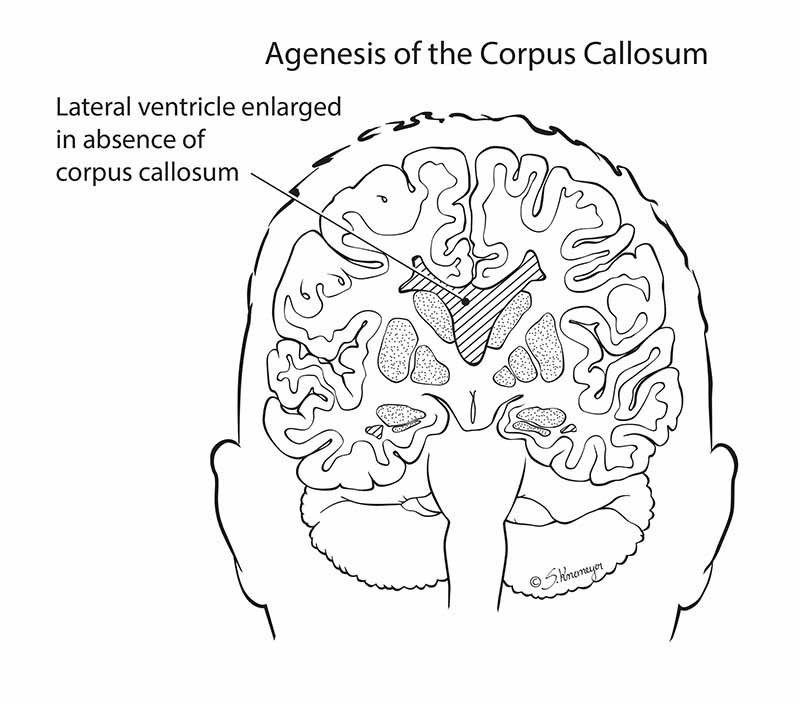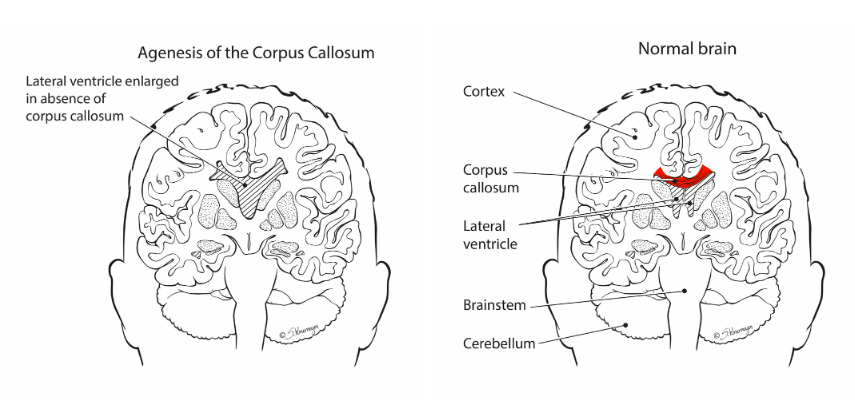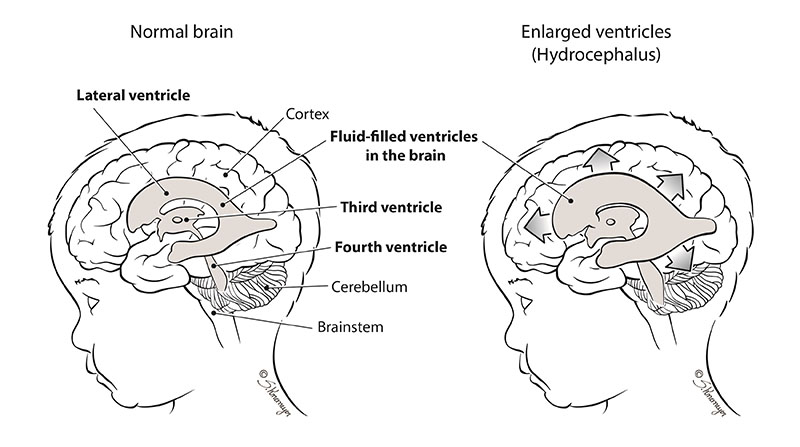Agenesis of the Corpus Callosum
Agenesis of the corpus callosum (ACC) is a rare, congenital (existing at birth) brain defect where a structure called the corpus callosum does not develop normally
What Is Agenesis of the Corpus Callosum?
Agenesis of the corpus callosum (ACC) is a rare, congenital (existing at birth) brain defect where a structure called the corpus callosum does not develop normally.
The corpus callosum is a band of tissue connecting the left and right sides of the brain. It is made up of nerve fibers that send information between the two sides of the brain. Problems during development of the corpus callosum can range from underdevelopment, where there are fewer than normal numbers of fibers connecting the two sides of the brain (partial agenesis) to the complete absence all connections (complete agenesis).
ACC can occur by itself, or with other types of genetic syndromes and disorders. The severity of the symptoms due to ACC is highly variable. Some children with ACC will have developmental and physical problems that will require lifelong medical care, and may require surgery. Other children will have normal intelligence with only mild neurologic problems and should lead normal lives. Sometimes symptoms aren’t noticed until adulthood.
All babies with ACC can benefit from physical and occupational therapy. Early intervention and support is critical to helping these children reach their full potential.

What Causes Agenesis of the Corpus Callosum?
No one knows what causes ACC, but research suggests there can be a genetic connection. Some of causes of ACC include:
- certain inherited genetic disorders
- an infection or injury during the twelfth to twenty second week of pregnancy that impacts the fetuses developing brain
- fetal alcohol syndrome ( the baby being exposed to alcohol while in the womb)
Sometimes no cause for ACC can be found.
How Is Agenesis of the Corpus Callosum Diagnosed?
ACC may be found during routine prenatal ultrasound if the absence of the corpus callosum is noticeable. If your doctor suspects a defect, additional tests may be ordered. These may include:
- Anatomy ultrasound – a high-resolution ultrasound to confirm the diagnosis and assess for other anomalies
- Fetal MRI – a non-invasive imaging technique to help provide additional details of the baby’s organs that may not have been visualized on ultrasound
- Fetal echocardiogram – a specialized ultrasound to evaluate the baby’s heart structure and function
Milder forms of ACC may not be found until later childhood or even the teen years, when learning problems may become clearer. In rare cases, there have been adults identified with undiagnosed ACC.
Other Tests
Some congenital conditions are caused by changes in DNA, or a baby’s genetic makeup. The doctors may suggest genetic testing to find out more about your baby’s DNA either during pregnancy or after birth. Recommended tests may include:
- Cell-Free fetal DNA testing – Your doctor can take a sample of your blood to look for copies of fetal (baby) DNA. This is only a screening test. A positive result means that there could be problems with the baby’s DNA. This should be confirmed with another test to be sure of the result. A normal result does not mean that there are no underflying genetic problems. Other testing can be done before or after birth depending on your needs and the needs of the baby.
- Amniocentesis – A small sample of the amniotic fluid that surrounds the baby in the womb is taken and tested for DNA problems. This test is usually done in the middle of the second trimester. An amniocentesis can be used to confirm findings on the cell-free fetal DNA test.
- Testing the baby – After birth, a test is done with a sample of your baby’s blood to look for chromosome problems. This is called either a “karyotype” (basic chromosome study), or microarray (a more detailed look at smaller sections of DNA).

What Are the Symptoms of Agenesis of the Corpus Callosum?
ACC happens between the third and twelfth week of pregnancy while the brain is just beginning to develop. While ACC can be caused by a range of disorders, there are some common signs and symptoms including:
- Additional brain abnormalities that were not detected prenatally, such as:
- hydrocephalus (excess fluid in the brain)
- Arnold- Chiari malformation
- schizencephaly (deep clefts in brain tissue)
- holoprosencephaly (problem with development of the cortex of the brain)
- migration disorders (defects in the way the brain tissue develops)
- vision problems
- low muscle tone (hypotonia)
- feeding and swallowing problems
- unusual head shape and facial features
- problems with hormone levels
- seizures
- hearing problems
- delays with development of motor and learning skills
- speech delay

Care After Your Baby Is Born
At the delivery hospital, a neonatologist will manage the care of your baby. The specifics of the care your baby receives will depend on your child’s exact condition:
- Your baby may be able to breastfeed or feed from a bottle and go home with you.
- Your baby may receive care in the delivery hospital’s neonatal intensive care unit (NICU).
It is very important for your baby to have a follow up appointment with the pediatric neurologist for a complete evaluation.
Following Up
Your baby will need regular follow-up appointments to measure growth, development, and nutrition. You will want to find a local pediatrician to take care of the routine checkups, immunizations, and doctor’s visits. The NCH program coordinator can help if needed.
Care for children born with ACC focuses on preventing medical problems and maximizing the child’s abilities. Physical and occupational therapy and early intervention are important in helping your child develop mentally, physically and socially. The best results happen when these interventions continue through childhood and into adulthood.
Most parents who have one child with ACC do not have another with the condition. However, your doctor may recommend genetic counseling to discuss risks for a future pregnancy because ACC can be related to inherited disorders.
